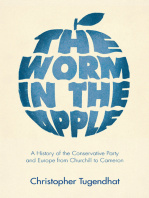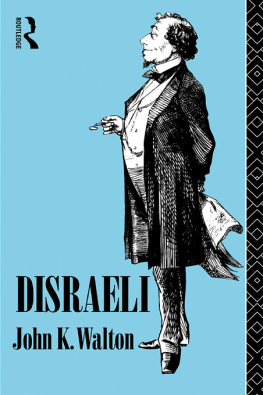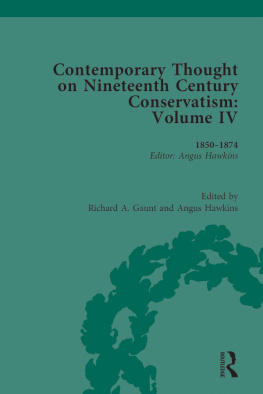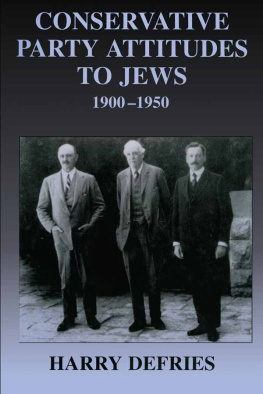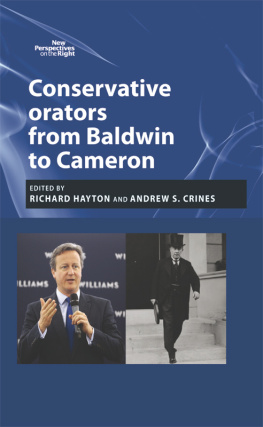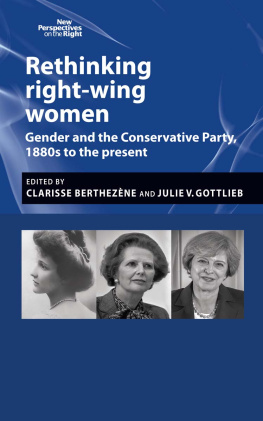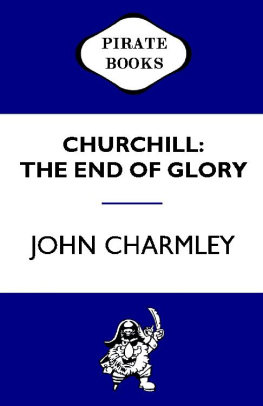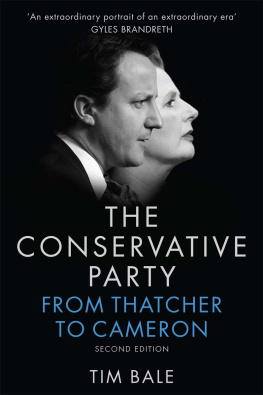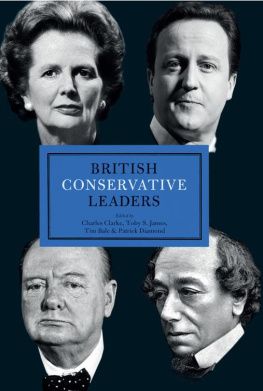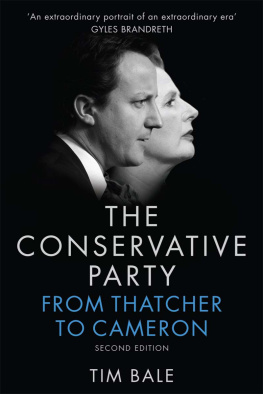A History of Conservative
Politics since 1830
John Charmley is Professor of Modern History and Head of the School of History at the University of East Anglia.
His previous publications include Chamberlain and the Lost Peace (1990) and Churchill: The End of Glory (1993).
A History of Conservative Politics since 1830
Second Edition
John Charmley


British Studies Series
General Editor: Jeremy Black
John Charmley 1996, 2008
All rights reserved. No reproduction, copy or transmission of this publication may be made without written permission.
No paragraph of this publication may be reproduced, copied or transmitted save with written permission or in accordance with the provisions of the Copyright, Designs and Patents Act 1988, or under the terms of any licence permitting limited copying issued by the Copyright Licensing Agency, 90 Tottenham Court Road, London W1T 4LP.
Any person who does any unauthorised act in relation to this publication may be liable to criminal prosecution and civil claims for damages.
The author has asserted his right to be identified as the author of this work in accordance with the Copyright, Designs and Patents Act 1988.
First edition A History of Conservative Politics 19001996
published in 1996 Second edition published in 2008 by
PALGRAVE MACMILLAN
Houndmills, Basingstoke, Hampshire RG21 6XS and
175 Fifth Avenue, New York, N.Y. 10010
Companies and representatives throughout the world.
PALGRAVE MACMILLAN is the global academic imprint of the Palgrave Macmillan division of St. Martins Press, LLC and of Palgrave Macmillan Ltd. Macmillan is a registered trademark in the United States, United Kingdom and other countries. Palgrave is a registered trademark in the European Union and other countries.
ISBN-13: 9780333929742 hardback
ISBN-10: 0333929748 hardback
ISBN-13: 9780333929735 paperback
ISBN-10: 033392973X paperback
This book is printed on paper suitable for recycling and made from fully managed and sustained forest sources. Logging, pulping and manufacturing processes are expected to conform to the environmental regulations of the country of origin.
A catalogue record for this book is available from the British Library.
A catalog record for this book is available from the Library of Congress.
10 9 8 7 6 5 4 3 2 1
17 16 15 14 13 12 11 10 09 08
Printed and bound in China
To Rachael
Contents
Acknowledgements
The first version of this book appeared in 1996 as A History of Conservative Politics 19001996. This book updates the material in that volume, but takes the story back to Peel and forward to David Cameron, and in that sense (as well as others) is quite a different version; there are many reasons for this, including the exponential expansion of books on the Conservative Party over the past 10 years; whatever the electorate might think, the party continues to fascinate historians.
I remain grateful to those whose comments informed the first version, my old colleague, Professor Geoffrey Searle, Andrew Roberts, and the now, alas, late Alan Clark. I should also like to thank two current MPs, Keith Simpson and Richard Bacon, at whose side I learned a great deal about Conservative politics.
I am extremely grateful to Felicity Noble and Sonya Barker at Palgrave Macmillan for bearing with me whilst this volume was completed. I would like to thank one of Palgrave Macmillans anonymous readers for his advice, which has saved this volume from some of the more egregious errors of its predecessor. I am grateful to my secretary at the University of East Anglia, Judy Sparks, for her help in getting the book ready.
On a more personal level, and at a professional one, I am very grateful to my son, Gerard, who not only read the whole volume with a critical eye, but provided much of the material on which the final chapter is based. To my wife, Rachael, without whose encouragement and care this volume could not have been complete, my gratitude is beyond the power of words to express.
Harleston, Norfolk
1 The Conservative Tradition
The Conservative Party exists to conserve; it is the party of the status quo. Unfortunately for it and its adherents all things change the flower withereth and the grass fadeth. In another world perhaps these things are restored and made new, but in this world the process of change poses a fundamental challenge to Conservatism as a political force. Many of those who vote Conservative do so because of an instinctive distaste for the consequences of change, but for a Conservative Party some accommodation with this process is inevitable if only to ensure political survival. There is, then, a tension between instinctive Conservatism and expediency. Because of this, all Conservative leaders have faced charges of opportunism and betrayal; but historians have generally judged them by their success in adapting to change. Since the Conservative Party has existed for nearly 200 years, during which time Britain has changed beyond recognition, historians are agreed that the Party has been a great success; visceral Conservatives are less easily convinced. Even in 2005, after three successive election defeats, there were those in the Party who argued that its sufferings were due to its failure to abide by traditional values. This Tory Taliban tendency, as one wag called it, has existed in every age, and its song has ever been the same: it harkens back to some bygone golden age, and calls its party to repentance and reformation of life. It might be unkind to point out that in the last golden glow of aristocratic rule, before the country went to the dogs, the Conservatives were, for the most part, in opposition, and that it was only with the advent of democracy that they came to dominate British politics; this always puzzled Marxists, since it ran counter to their theoretical model, but since 1989 those remaining disciples have had other things to distract them from this little local difficulty.
The twentieth century dominance of the Conservative party has created a misleading historiography, best expressed in Lord Blakes highly readable and influential history of it.Peel chimed with Lord Blakes own conservatism was not, perhaps, wholly coincidental. If the reader drew from the tale the moral that all good Conservative leaders should be mild, and sensible, and good as him, then Robert Blake would not have been displeased. Lord Blake sketched the alternatives facing the Tories after their debacle at the 1832 General Election: the Ultra Tory option of resistance; the Tory Radical option of an alliance with the lower orders; and the Peelite option of adaptation to circumstances. The first of these would lead to death (no doubt glorious) in the last ditch; the second was the unfeasible dream of the young Disraeli, and fell at the first fence of practicality (the lower orders did not have the vote); and so it was that Peels moderate Conservatism came to replace the less flexible Toryism of Wellington which was why a new word was needed, although the old one remained in use. On the back of this strategy, and with a new emphasis on party organisation through the founding of the Carlton Club in 1839, the Conservatives came into their inheritance in 1841, only to be deprived of the fruits of Peels foresight and moderation by disputes over the Corn Laws. The great minister fell from power, but not public and political esteem, whilst his blockheaded supporters were condemned to a quarter of a century in the political wilderness before the prophet Benjamin (Disraeli) brought them back to the Promised Land by adopting a Peelite approach to the great issue of the day. The success of the Disraeli/Peelite strategy could be seen in the fact that between 1874 and 1905 the Conservatives were in office for all but eight years a startling reversal of fortunes. This happy state of affairs was brought to an end when the party, or rather the leader of its Liberal Unionist allies, Joseph Chamberlain, raised the thorny issue of reintroducing Protection through the ingeniously named Tariff Reform. Leaving the broad road of pragmatism for the dense thickets of principle, the Conservatives found themselves so entangled in the mire that they once again lost disastrously at a General Election, and from 1905 until the First World War, they languished in opposition. It was only with the advent of the sensibly moderate Stanley Baldwin, so well-attuned to the necessities of the new politics of democracy, that the Conservatives returned to winning ways: Winston Churchill, Anthony Eden, Harold Macmillan and Edward Heath were all dedicated followers of the middle way, and so it was that the Conservatives thrived.
Next page

